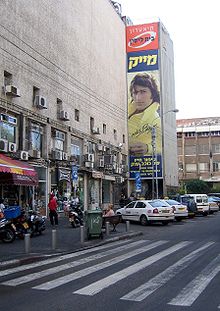- Mike Brant
-
Mike Brant 
Background information Born February 1, 1947, Cyprus Origin Haifa, Israel Died April 25, 1975 (aged 28), Paris Genres Pop Occupations Singer Instruments Vocals Years active 1969–1975 Labels EMI, NMC Website http://www.mikebrant.com Mike Brant (born Moshe Brand, Hebrew: משה ברנד) (February 1, 1947 – April 25, 1975) was an Israeli pop star who achieved fame after moving to France. His most successful hit was "Laisse-moi t'aimer" ("Let me love you"). Brant committed suicide at the height of his career by jumping from the window of a Paris apartment.
Contents
Biography
Childhood
Mike Brant's mother was Bronia Rosenberg, originally from Lodz in Poland, who was a survivor of the Auschwitz concentration camp. After the war, she married Fishel Brand, a resistance fighter from Bilgoraj 20 years her senior, and they applied to emigrate to the British Mandate of Palestine, but were initially denied permission, and sent instead to a refugee camp at Famagusta on the island of Cyprus, and it was here that Mike was born on February 1, 1947. In September 1947, the family finally received permission to travel to Palestine, and they arrived in Haifa, and settled in a kibbutz in Galilee. Mike Brant did not start speaking until 6 years of age, and very soon told his family and friends that when he grew up he'd be "a star... or a tramp!" At the age of 11 he joined his school choir.
Musical career
When he was 17, Moshe Brand joined his brother's band, "The Chocolates," as lead singer. The band started at parties and cafés in Haifa and Tel Aviv and moved on to nightclubs in hotels. Brant sang in English and in French, although he spoke only Hebrew. In 1965, he changed his name from Moshe to Mike because it sounded more international. He was discovered by the Israeli impresario Jonathan Karmon, who signed him for a tour around the US and South Africa that lasted almost a year.
In May 1969, Brant performed at the Hilton Hotel in Teheran, Baccara. A young French singer, Sylvie Vartan, also on the bill, was impressed and urged him to come to Paris. Brant arrived on July 9, 1969. It took ten days to find Vartan but eventually she introduced him to the producer Jean Renard, who had turned Johnny Halliday into a star. Under Renard's guidance, he changed his family name from Brand to Brant, and recorded his biggest hit, "Laisse-moi t'aimer" ("Let Me Love You"). The song was a success at the Midem music festival in January 1970. "Laisse-moi t'aimer" sold 50,000 copies in two weeks.
Success
Brant represented France in a radio contest broadcast all over Europe and in Israel. His song, sponsored by Radio Luxembourg, was "Mais dans la lumière" ("But Inside the Light"). He won. He continued to release hits: "Qui saura" ("Who Knows"), “L’Amour C’est Ca, L’Amour C’est Toi” (written by Paul Korda/Robert Talar), “C’est Ma Priere” ,"Un grand bonheur" ("Great Happiness") and "Parce que je t'aime plus que moi" ("Because I Love You More Than Myself). His first album, "Disque d'Or" ("Gold Record") sold millions. Brant took a song written and composed by his friend Mike Tchaban/Tashban "Why do I love you? Why do I need you?" but French radio would not air it because it was in English. Brant returned home.
In February 1971, Brant was injured in a road accident, which was mediatised. In reality he only encountered minor injuries. That year, he gave concerts in Israel. During the Yom Kippur War in 1973, he performed in Israel before front-line soldiers.
Suicide and death
By 1973, he was giving 250 concerts a year, some attended by 6,000–10,000 people. This went on for two years. He suffered from depression and loneliness, and from the second generation syndrome (family history during the holocaust). On November 22, 1974, he attempted suicide, jumping out the window of his manager's hotel room in Geneva. He suffered fractures but survived. He cut the number of performances and concentrated on another album, Dis-lui ("Tell Her", French version of "Feeling").
On April 25, 1975, the day his new album was released, Brant leapt to his death from an apartment located at 6 Rue Erlanger in Paris. He was 28.[1]
Mike Brant was buried in Haifa.
Commemoration
A documentary Laisse-moi t'aimer: Dmaot Shel Malachim (Tears of Angels) was released in April 1998. It was a French-Israeli co-production.
References
- ^ Kaye, Helen (November 27, 2007). "Mike Brant's life story hits the stage". The Jerusalem Post. http://fr.jpost.com/servlet/Satellite?cid=1195546735914&pagename=JPost/JPArticle/ShowFull. Retrieved August 28, 2009.
External links
Categories:- 1947 births
- 1975 deaths
- French-language singers
- Israeli Jews
- Israeli male singers
- Israeli pop singers
- Jewish singers
- Musicians who committed suicide
- People from Haifa
- Suicides by jumping from a height
- Suicides in France
Wikimedia Foundation. 2010.
